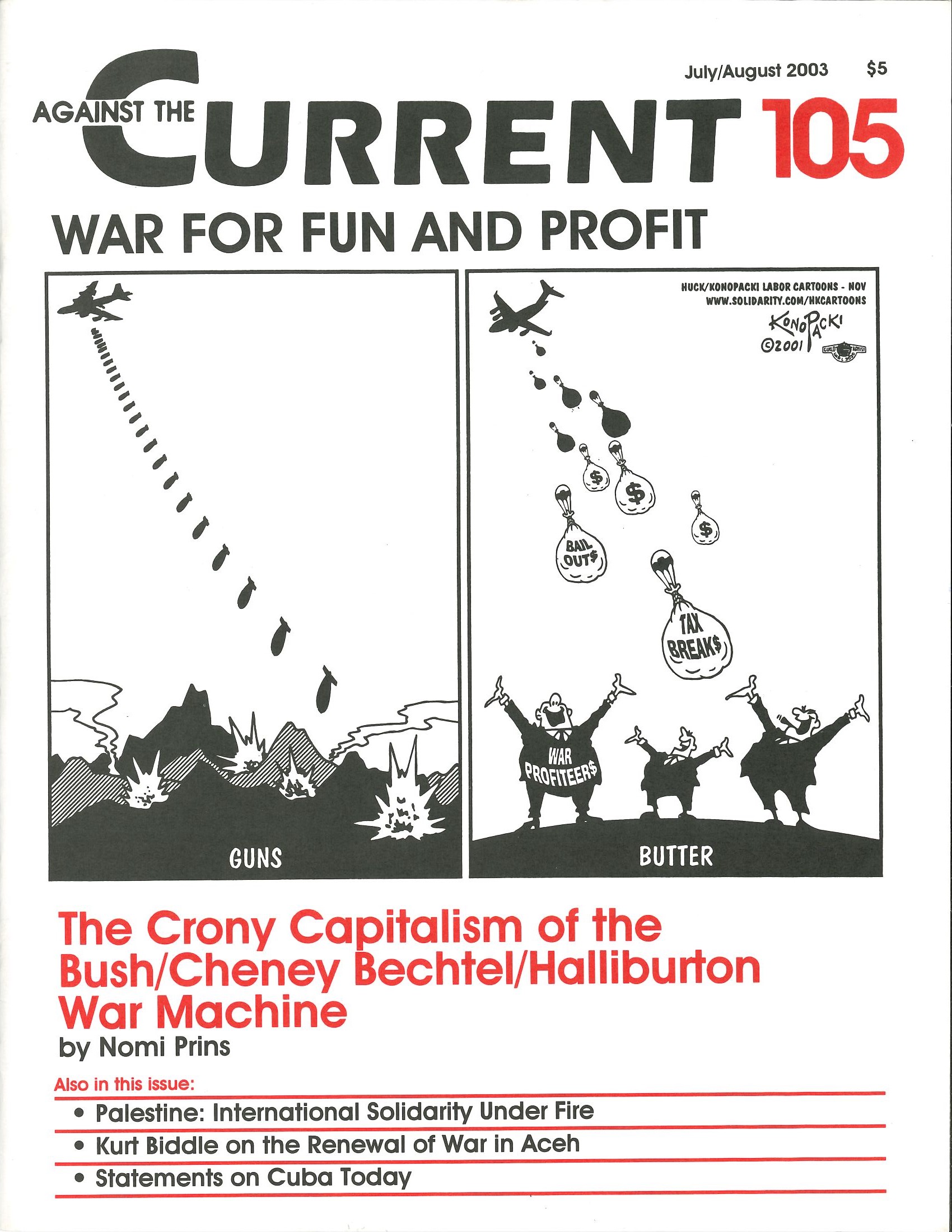Against the Current, No. 105, July/August 2003
-
What the Airline Crisis Shows
— The Editors -
"War on Terror" versus Native Sovereignty
— Andrea Smith -
Old and New War in Aceh
— Kurt Biddle -
France, Chirac and Bush's War
— Sophie Beroud and Patrick Silberstein -
The New Strike Wave
— Sophie Beroud and Patrick Silberstein -
A Voice for the Irish Left Wing
— Tommy McKearney -
Inside the Crony Wars
— Nomi Prins -
From Lynching to Lethal Injection
— Jan Boudart -
Random Shots: Iraq and a Hard Place
— R.F. Kampfer - The International Solidarity Movement
-
Confronting the Occupation
— David Finkel -
The Israeli Army Shot My Brother
— Sophie Herndall -
Our Humanity in the Balance
— Carel Moiseiwitsch, Gordon Murray and Drew Penland -
One Day in Ramallah
— Daniella, ISM volunteer -
Palestine: Dying for Peace
— Louisville Middle East Peace Delegation - Discussing Cuba
-
An Introduction
— The ATC Editors -
To the Conscience of the World
— a statement initiated by 10 prominent Mexicans -
A Statement by Solidarity
— Political Committee of Solidarity -
A Fourth International Statement
— Executive Bureau of the Fourth International -
Stop Bush's New Aggression Against Cuba
— statement initiated by the International ANSWER Coalition -
Oppose Repression in Cuba
— statement published by the Campaign for Peace and Democracy -
Why the Cubans Acted Now
— Joaquín Bustelo -
Cuba Makes Me Hurt
— Eduardo Galeano -
This Is Where I Get Off
— Jose Saramago -
Cuba: We Know, and So What?
— Alain Krivine - Reviews
-
Rebel Pens, "Pencil Hands," and Labor Journalism
— Steve Early -
The Lost Art of "Scottsboro" in Linoleum Cuts
— James A. Miller -
Judith Ezekiel's Feminism in the Heartland
— Sonya Huber -
Tanya Reinhart's Israel/Palestine: How to End the 1948 War
— David Finkel - In Memoriam
-
Julius Jacobson (1922-2003)
— Samuel Farber -
Michael Kidron (1939-2003)
— Samuel Farber -
Nina Simone: And She Meant Every Word of It!
— Kim D. Hunter
Alain Krivine
WE KNOW THAT today Cuba is one of the Bush Administration’s main targets. Cuba is spared nothing. The island’s economic situation gets harder and harder, and we know what awful consequences the embargo has for people’s daily lives.
We know the role the CIA plays with its project of destabilizing Cuba, and we know in particular about the militant, provocative activity of James Cason, head of the U.S. Interests Section in Havana.
We know that unfortunately part of the opposition participates in CIA activities. We know that some of the “democrats” who wax indignant about the lack of democracy in Cuba also sing the praises of the “American values” carried to Iraq and Afghanistan in B52s.
We know finally that the Bush Administration practices state terrorism. The war against Iraq, but above all the millions of people in the world dying from AIDS or starvation thanks to the dictatorship of U.S. markets, bear witness to it.
For all these reasons we know that the US government has nothing to teach Cuba about democracy — the United States, which keeps hundreds of prisoners shackled in its Guantanamo camp, without names, without visits, without charges, without lawyers: the living dead.
We know all this, and so what? In the name of what should we keep silent in face of the wave of repression that is rolling across the island today? The defense of basic democratic liberties and rights is not a dish you can order a la carte, but rather an essential part of our revolutionary struggle and of the kind of society that we want to build.
We’re against the death penalty. It is morally intolerable and politically ineffective. Shooting three convicted defendants in Cuba, one week after a trial behind closed doors, is no more glorious than plugging in the electric chair in Atlanta twenty years after the sentence is handed down.
We are for every defendant’s right to defend him- or herself, to have time to choose a lawyer, and to have a public trial open to foreign observers. This was not the case with the dozens of dissidents recently sentenced to heavy prison sentences.
We’re against any crime of opinion. Freedom of speech is a basic right, public debate is a necessity and the battle of ideas a source of enrichment. But this is not the situation in Cuba today.
So yes, we totally condemn the parody of justice that has just taken place. And we do so with the dual concern of defending the project of a socialist society that we’re fighting for, but also and above all in order to defend the Cuban people’s conquests and its revolution better against imperialist aggression.
ATC 105, July-August 2003

